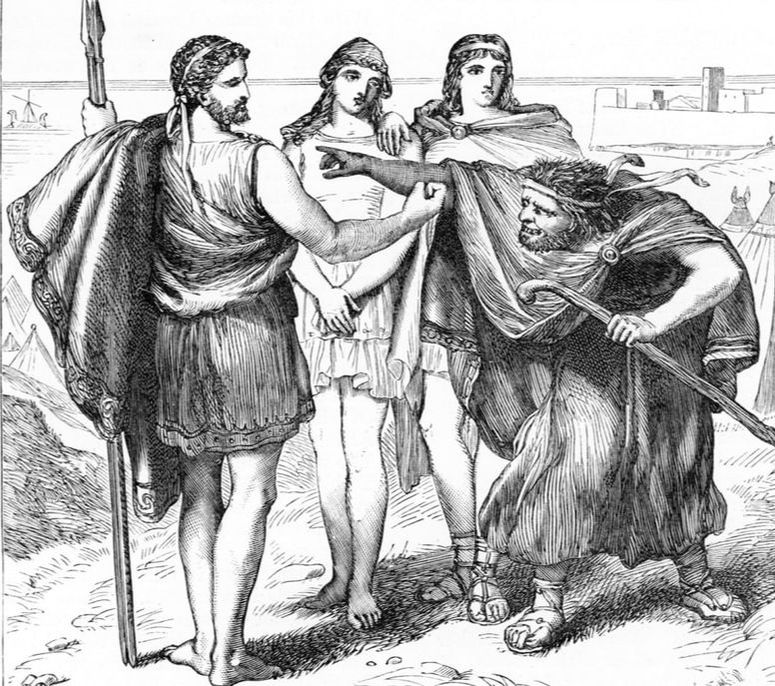Thersites
This is the man universally known and remembered for carrying an ugly soul inside an ugly body. Thersites conspired against Oeneus, taking the kingdom of Calydon from him and giving it to his father.
However, he had later to escape from Diomedes's revenge, and came to Peloponnesus. Thersites was of measureless speech and lame in one foot. And having laughed at Achilles' love for Penthesilia after her death, he brought Achilles' wrath upon himself, and was killed by him.
"Fool, who in sack of towns lays temples waste, and tombs, the sanctuaries of the dead! He, sowing desolation, reaps destruction."
(Poseidon. Euripides, Daughters of Troy 90).
"Homer also testifies to this; for he has represented kings and potentates as those who are punished everlastingly in the nether world — Tantalus and Sisyphus and Tityus; but Thersites, or any other private person who was wicked, has been portrayed by none as incurable and therefore subjected to heavy punishment; no doubt because he had not a free hand, and therefore was in fact happier than those who had. For in fact, Callicles, it is among the powerful that we find the specially wicked men."
(Socrates in Plato’s Gorgias 525d-526b)
Thersites helps to overthrow King Oeneus
After the death of Tydeus during the war of the Seven Against Thebes, his old father Oeneus, now bereft of children, saw his throne in Calydon shaken. It was then that Thersites and his brothers (Onchestus, Prothous, Celeutor, Lycopeus, and Melanippus) deemed that the time had come to take power through sedition. So they deposed their uncle King Oeneus; but as such conspirators usually become afraid of their own deeds, they also imprisoned and tormented him, believing that cruelty would protect them.
Diomedes expels Thersites
Having thus seized power, they put their own father Agrius on Oeneus's throne. However, Tydeus's son Diomedes appeared in Calydon accompanied by Alcmaeon, the future leader of the Epigoni against Thebes, and assisted by him, seized back what belonged to his grandfather Oeneus.
But as these fights for power usually cause bloodshed, also this time many were killed, particularly most of Thersites' brothers. Himself and his brother Onchestus, however, could escape to the Peloponnesus, while their father Agrius, having been expelled from the kingdom, committed suicide.
End of Oeneus
Diomedes did not restore the power to Oeneus because he was too old; so the king's son-in-law Andraemon (for he was married to Gorge) became king, and Diomedes took Oeneus with him to Argos.
But in Arcadia, as it is told, Onchestus and Thersites lay in wait for the old man, and killed him. Diomedes brought the corpse to Argos and buried him in Oenoe, called after the old king.
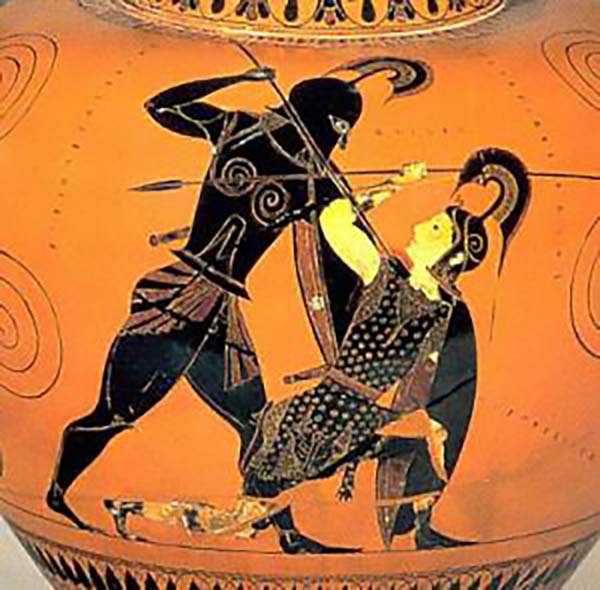
Thersites comes to Troy
These were Thersites' inglorious deeds in some of the minor military adventures that took place between the war of the Seven Against Thebes and that of the Epigoni. Now, no one who is eager to go to a big war would need to be disappointed; for wars come one after the other, as ships to a busy harbor, or thoughts to the brain.
And Thersites, who being engaged in his conspiracies, missed two big wars, came, for one or another reason, to the third and biggest of all: the Trojan War.
Ugliest in the army
And they say that he was the ugliest man that ever came to Troy, for he was hunchbacked, had a lame foot, was bandy-legged, and on his egg-shaped head there were but a few short hairs. But then no other war has seen so many handsome men assembled, some of which were even sons of gods and goddesses.
Courage & Cowardice
Now, courage is a queer disposition of the soul that allows, among other things, to endure such an enormity. But many feel more brave before the war, while they still feel safe at home, than during the carnage when they may sleepless roll over in the mud among pestilent corpses.
And he who keeps his courage under such conditions, despising both life and death, is praised whereas those who don't, are called cowards; for they forget why they came to the war in the first place, and instead they just care about staying alive and returning to their comfortable lives back home, where there often waits a beautiful woman.
Agamemnon tests his men
Thersites, who as a pastime used to play dice with Palamedes, the same man whom the Achaeans accused of being a traitor, is remembered among the cowards. For when King Agamemnon tested his troops by tempting them to return without having taken Troy, Thersites approved. Said the king:
"Our wives and little children sit at home and wait for us. Meanwhile the task we set ourselves when we came here remains undone. So now let every man of you take his cue from me. Aboard the ships, I say, and home to our own country! Troy with its broad streets will never fall to us." (Agamemnon to the army. Homer, Iliad 2.135).
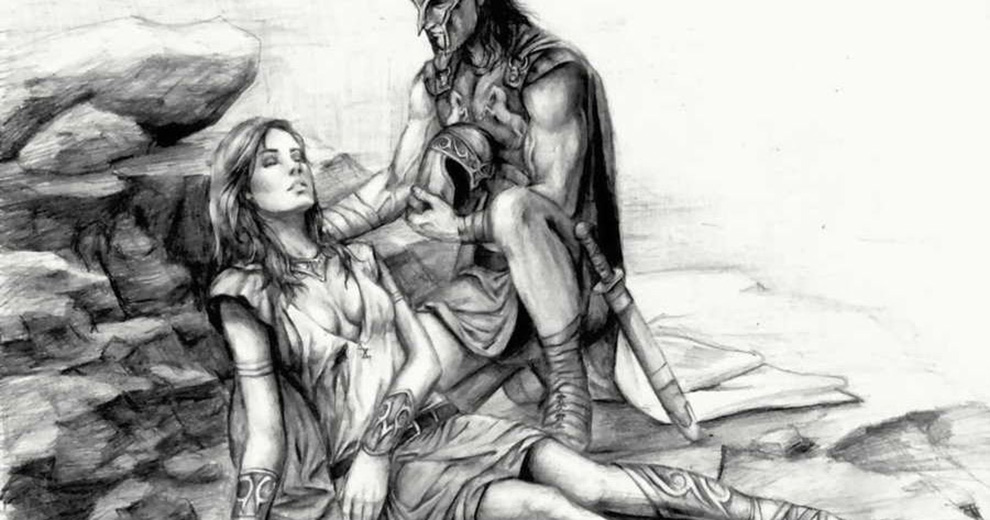
Thersites dares to talk aloud against the king
On hearing this speech, many in fact made a dash for the ships. It took time to restore order, but it showed who were on which side. When all sat down again, Thersites addressed the assembly:
"My lord ... what is your trouble now? What more do you want? Your huts are full of bronze, and since we always give you the first pick when a town is sacked, you have plenty of the choicest women in them too. Maybe you are short of gold...or one more girl, to sleep with ..." (Thersites to the army. Homer, Iliad 2.224ff.).
This is how Thersites abused the king, recalling even Agamemnon's conflict with Achilles:
"... Only a little while ago he insulted Achilles, a far better man than he is. He walked off with his prize and kept her for himself."
So he concluded:
"Let us sail for home ... and leave this fellow here to batten on his spoils and find out how completely he depends on the ranks."
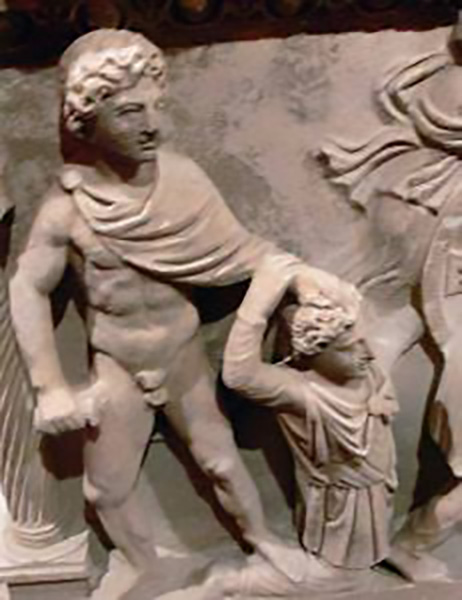
Odysseus rebukes and hits
When Thersites' seditious diatribe was over, Odysseus, after rebuking him harshly for daring to stand up against the king and insolently abuse him, threatened him:
"... If I catch you once again playing the fool like this ... I will strip you of your clothes ... and then trash you ignominiously and throw you out of the Assembly to go and blubber by the ships." (Odysseus to Thersites. Homer, Iliad 2.258ff.).
And having said so, Odysseus struck him on the back and shoulders with his staff, causing a bloody weal. Much later, when Odysseus needed to show his merits in order to be awarded Achilles' armour, he recalled the episode:
"... I turned them from their intended flight and led them back. The Atrides assembled the allies still perturbed and fearful ... But Thersites dared ... to chid the kings with insubordinate words, but, thanks to me, not without punishment! I arose and urged my faint-hearted comrades against the enemy, and by my words I restored their lost courage." (Odysseus to the army. Ovid, Metamorphoses 13.232ff.).
Thersites' reaction
Some may believe that Thersites, a man with such an audacious tongue, would stand up and defend himself. But Thersites flinched, and sitting down terrified, brushed away his tears.
And as many enjoy others' disgrace, whether deserved or not, the army laughed at Thersites' expense, whom they supposed would keep quiet in the days to come. That is what vulgarity, in conjunction with bad looks, may accomplish, no matter how true or false words might be. But Agrius, they say, may have called Thersites fair.
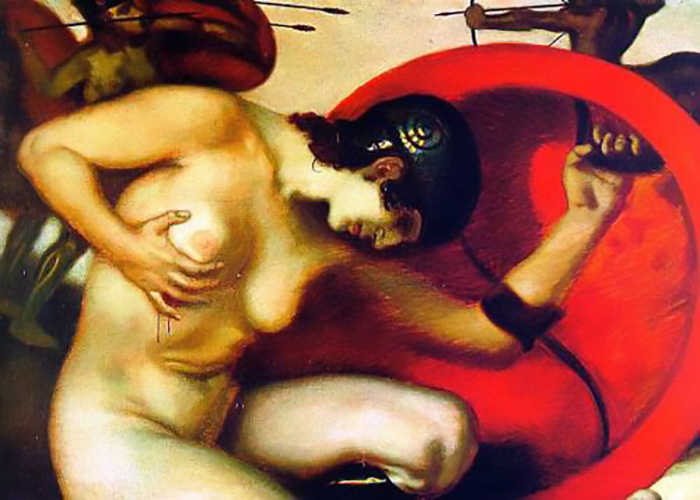
Thersites' last jest
After the death of Hector, who was the pillar of Troy, allies came to help the beleaguered city. Among these were the AMAZONS, then led by Queen Penthesilia, who is credited with the deaths of many Achaeans. However, she met Achilles, and he slew her. But when he saw her dead in all her loveliness, he felt remorse for having slain a thing so sweet.
For Penthesilia, they say, looked like an immortal, and in her death she seemed to sleep. This is why Achilles' heart grew wrung, contemplating her who was a wonder of beauty even in death. And as he gazed on her with broken down heart, Thersites brought him to earth:
"Achilles! Are you not ashamed to let some evil power beguile your heart to pity of a pitiful Amazon, whose furious spirit purposed nothing else but ill to us and ours? Ha, you are woman-mad, and your soul lusts for this thing, as she were some lady wise in household ways ... Good had it been had her spear reached your heart ... Sorry wretch, where is now all your goodly prowess? Where your wit? ... Nothing there is to men more ruinous than lust for woman-s beauty; it makes fools of wise men ..." (Thersites to Achilles. Quintus Smyrnaeus, The Fall of Troy 1.723).
This was the last jest of Thersites, whose mind, they say, was full of a great store of disorderly words. For wrath took the heart of Achilles, who, with a sudden buffet, dashed all of Thersites' teeth to the earth, making him fall dead upon his face, while his blood gushed in a torrent.
Opinions about who and when
It has been said that Thersites' cousin Diomedes was angry at Achilles because of he causing Thersites' sudden departure to the next world. For there are those who believe that the coup d'état against Oeneus took place after the Trojan War, and not before.
In such a case, neither Thersites had been involved in the conspiracy against Oeneus, nor had Diomedes expelled him from Aetolia. Some say that of the sons of Agrius, Diomedes only killed Lycopeus, and it has also been said that Diomedes attack on Calydon took place after the Trojan War and his subsequent expulsion from Argos, but naturally before his exile in Italy.
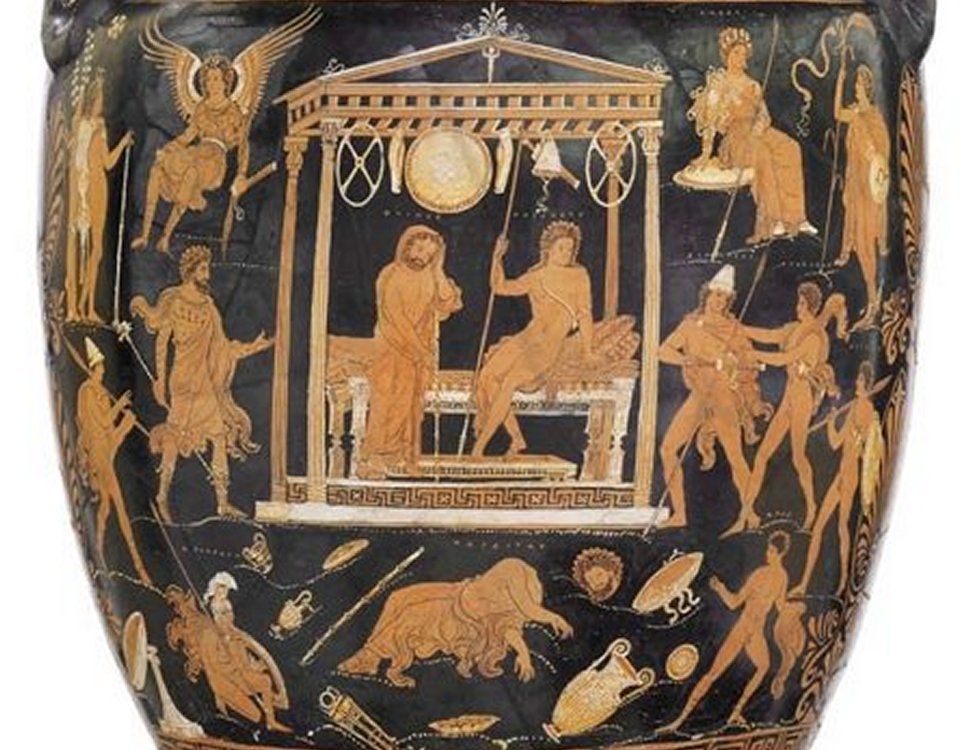
Sources
Homer,Iliad
Tzetzes, Chiliades 7.888
Scholia on Iliad, 2. 212
Pseudo-Apollodorus, Bibliotheca 1. 7. § 10, 8. § 5, &c.
The Rhetoric of Morality and Philosophy by Seth Benardete, 1991, pp. 100–101.
"Analyses et réflexions sur Gorgias", by Luc Brisson, p. 152.
Plato, Gorgias, 525e.
Gorgias, ed. by E. R. Dodds, 1959, p. 382.
"Greek Mythology Link"


